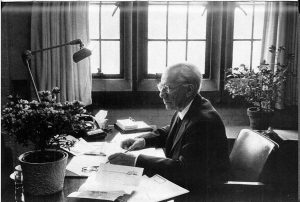A Sermon by the Rev. Dr. Arthur M. Suggs, preached on the Eighth Sunday after Pentecost, July 15, 2018.
A New Graduate from Seminary Is Self-Assured Enough to Know the Problem in the World Is Sin.
Today’s sermon is actually a continuation of last Sunday’s preachment. On July 8, we had Margie Price in the pulpit. (She had also been a guest preacher here last summer.)
Last week, she decided to speak on sin, which I don’t do often, so I’m listening to Margie intently while sitting in the pew, with my mind going around in a dozen different directions.
That’s probably what you’re doing right now, but two things rattled around in my mind while I was paying attention to the sermon on sin, and one was a memory on the same subject.
I shared this with you before, but it’s one of those things that sticks in my memory:
This happened many years ago, when I was invited to dinner by a single mom who was a member of my church, and her only son had just graduated from seminary. Being immensely proud of her son, who was returning home to visit one weekend, she invited him and his wife for dinner to meet Tracy and me and a few other people as well for a meet and greet get-together.
The new graduate was, to put it bluntly, very ego-secure.
He had an ability that would probably serve him well in a church where he could command people’s attention. When he spoke, others stopped their small talk and listened to him. The conversation was going back and forth at the dinner table, and talk turned to some of the problems in the world. You’ve got problems in the Middle East, problems here, problems there.
Finally, the newbie barged in with a self-assured, overweening statement as though it were a question, “You know what the problem is in the world!”
You’ve heard the expression, a pregnant pause? Well, this pause was going to give birth to triplets. Emphatically, he repeated, “You know what the problem is in the world!” And he waited. All eyes were on him.
Then he announced, “It is sin!”
I am really glad I didn’t chuckle. Yes, the problem is sin, but it’s like the most worthless answer you can imagine.
One other thing that came to mind while Margie was preaching was that wonderful Greek word that’s translated as “sin” in the New Testament, ’amartia.
As some of you know, it’s an archery term, meaning “missing the mark.”
It has the sense that there’s the bull’s-eye and you didn’t hit it. The feeling of it is a mistake or an error. It has the sense of an imperfection but it doesn’t have the feeling of a deep, fatal flaw in our souls that’s driving us to hell. Rather, this is a notion of needing improvement; you can do better.
Tillich Reforms the Notion of Sin as an Existential State Characterized by the Estrangement of Humanity

In her sermon, Margie referenced Paul Tillich (1886-1965) and the notion of sin as separation. I would like to expand on that idea a little.
Paul Tillich was an immigrant from Germany, by the way, and most of his time has been spent as a professor in the United States at Union Theological Seminary in New York City. He expanded the notion or revised it or reformed it as to the notions of both sin and of God. Let me go into both of those just a bit.
● First, sin. He says first and foremost that sin isn’t any given act like stealing or gossip, but it is rather an existential state in which we find ourselves, characterized by separation or estrangement. (Prescient — vis-à-vis Conversations With God and A Course in Miracles.)
It’s never “sins” in the plural, but rather the overarching state of being separate from God, separate from our fellow human beings, separate from our neighbors, and sometimes even separate from ourselves.
According to Tillich, our basic human condition is a “state of estrangement of man and his world from God.”

It’s implied, he wrote, in many different places in the Biblical symbolic descriptions of humanity’s existential plight.
For example, the expulsion from the garden; the hostility between humans and nature; the hostility between brothers, going all the way back to Cain and Abel, like the very first brothers and all the brothers since and sisters too; the confusion and estrangement among the nations; ever since the Tower of Babel, one nation has been against another nation; and even the prophets complain against the kings, and they complain about the people over idolatry.
There is lots of separation, lots of estrangement. You don’t have to look hard to find examples.
Tillich also Reforms the Notion of God as Being – Itself in the Ground of Being as an Existential Idea.
● Second, Tillich also reformed our definition of God. This is probably the concept he is most famous for, in which he understood God as being-itself, and he used the phrase the ground of being.
This metaphor is of God as the ground of our being. There are three ways you can take this:
1. One is an analogy. What ground is to a plant is what God is to a human being. You can let your mind fertilize that thought.
2. A ground state also means fundamental, like the basis or foundation. So on a fundamental ba-sis, there’s the ground level and everything above it, and it’s foundational or fundamental.
3. The third way of understanding this phrase is linked to Genesis (Chapter 2, Verse 7). This is the second crea tion story: “Then the Lord God formed man from the dust of the ground, and breathed into his nostrils the breath of life, and the man became a living being.”
For Tillich, “the concept of being as being, or being-itself, points to the power inherent in everything. . . . It is possible to say that [God] is the power of being in everything and above everything, the infinite power of beings.”

Consistently, Tillich refers to God as an idea, an existential idea in which God is the foundation of existence and meaning.
As an aside, this is linked to the name of God, given to Moses, when he said, “Who is sending me?”
And God answers, “YHWH,” which means “being, existence.” It means “I am.”
So God isn’t a separate entity up in heaven but rather is existence itself. So if something exists, then it is rooted in God. If you exist, then of necessity you are rooted in God, as the ground of your being. If a plant exists, then of necessity it is rooted in God, the ground of its being.
Sin is not being aware of it, of feeling separated, estranged. Not true whatsoever, but that doesn’t stop us from feeling that way. And all of us have felt that way, plucked up, uprooted, alone in a meaningless universe, separated and estranged from God, our fellow humans and nature, and sometimes even ourselves. But there’s not a whit of truth to it.
The cure, the healing, the salvation, is the realization that we are loved, accepted, united all along, despite having felt or thought otherwise.

Tillich calls it “grace.”
He writes compassionately:
“And if that word [God] has no meaning for you, translate it, and speak of the depth of your life, of the source of your being, of your ultimate concern, of what you take seriously. . . . For if you know that God means depth, you know much about him. . . . (The one) who knows about depth knows about God.” For Tillich, that which gives meaning to and is of ultimate concern in life, actually is God.
This is a very compassionate observation from a sermon Tillich gave:
“You are accepted. You are accepted, accepted by that which is greater than you, and the name of which you do not know. Do not ask for the name now; perhaps you will find it later. Do not try to do anything now; perhaps later you will do much. Do not seek for anything; do not perform anything; do not intend anything. Simply accept the fact that you are accepted!
If that happens to us, we experience grace.
After such an experience, we may not be better than before, and we may not believe more than before. But everything is transformed.
In that moment, grace conquers sin, and reconciliation bridges the gulf of estrangement. And nothing is demanded of this experience, no religious or moral intellectual presupposition, nothing but acceptance.”
Okay, now let’s get practical. Enough theory.
Sin Is Separation, Estrangement; the Reconciliation Is to Love Thy Neighbor; Church Is Safe to Do so.
God is the ground of our being. Grace is becoming aware of our connection, our rootedness, our being enfolded into the family of God.
At the Annual Meeting of the United Church of Christ of New York, in Syracuse about a month or so ago, the keynote speaker was Emily Heath, a New Hampshire minister.
She wrote a book called Glorify, and she talks about estrangement in one of the chapters. In it, she references a book called Bowling Alone by political scientist Robert Putnam, who writes about the fragmentation of our society. He uses “bowling alone” as both a fact and a metaphor.
“Between 1980 and 1993, the total number of bowlers in America increased by 10 percent, while league bowling decreased by 40 percent.”
Even as the sport grows, more and more are bowling alone.
But then he goes on. Between the 1960’s to the 1990’s:
Freemasons are down 71%,
American Legion is down 47%,
Red Cross Volunteers are off 61%,
PTA membership is off 60%, Rotary is down 25%.
You get the picture.
Between 1975 and 2000, when the book was published, family dinners dropped by 43 percent. Having friends over to the family house, regardless of why (dinner, wine and cheese, cards, watching the game), fell by 35 percent.
It is a deeper separation, a more profound estrangement. To state something every one of us knows intimately, we are also doing religion alone, and that is a problem.
It is our very interaction with others that our faith, our spirituality, our sense of interconnection and interdependence is deepened.
So now, let’s get very practical.
I’m going to ask you to hold two thoughts in your mind at the same time.
I want you in your imagination to envision somebody you don’t like. Somebody who ticks you off, somebody who votes another way.
Somebody who, every time you say something, says something contradictory. Imagine such a person.
2. And then, on this side, the commandment: Love your neighbor.
How do you reconcile that?
We all have this tension in our lives.
Love thy neighbor, one of the great commandments. Jesus was not fooling around when he said that. All of the law and the prophets depends upon it. Love your neighbor. Yet there are specific neighbors whom we can come up with.
How do we reconcile them?

Let me suggest this: Church — a relatively safe place to practice loving God, self, and neighbor. And by practice what I mean is getting up again after we have fallen down, trying again after we have missed the mark, loving and forgiving, loving and forgiving, loving and forgiving some more until one day we actually find ourselves being Christlike. It happens.
Imagine every oppositional person as a gift from God to strengthen and expand your ability to love.
Actually, that graduate from seminary was right. The problem with the world is sin.
But to hell with the problem.
Let’s attend to the healing, to the reconciliation, by coming together, forgiving one another, forbearing with one another, extending grace to one another, practicing kindness and compassion to one another, over and over and over again, and the result is love conquering the world.
Amen
Download or view the full Blest Be the Ties That Bind sermon in PDF format.

